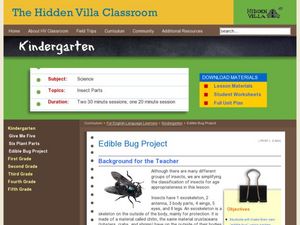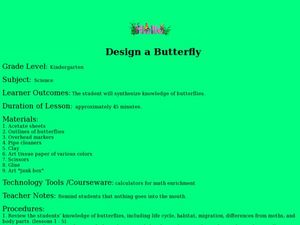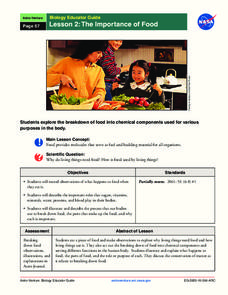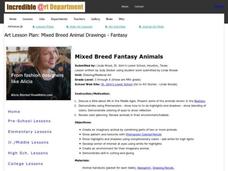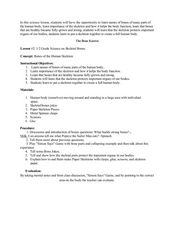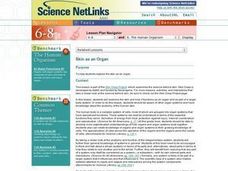Curated OER
Spanish: Body Parts and Beyond
Students drill on Spanish vocabulary words by participating in a card game. They use a list of teacher-prepared clues that are glued to cards. Later they apply these words to skits and dialogues about health issues.
Curated OER
My Monster
Explore descriptive language. Learners read a series of similes describing the eyes, teeth, skin, and other features of a monster. Then, they describe their own imaginary monster using similes and adjectives. Very creative!
Curated OER
The Circulatory System - Part II
First graders recognize that the heart muscle requires food. Students observe a Venn Diagram to identify foods that are good for them. Students provide one ingredient to make healthy heart soup.
Curated OER
Body Basics
Youngsters discuss the basics for appropriate bodily behavior in the classroom. This lesson addresses the importance of keeping one's hands to yourself, raising your hand when wanting to speak, and keeping your eyes on teacher when they...
Student Aware Communications
Auto Mechanic’s Search
From air conditioner and body work to thermostat and transmission, the terms used in this simple word puzzle cover a range of vocabulary related to auto shop and automotive technology.
Curated OER
Edible Bug Project
Students recognize the characteristics of insects. In this edible bugs lesson, students observe the body parts of an insect. Students create an edible insect using a grape, carrot sticks and sorrel stems and leaves. ...
Curated OER
Design a Butterfly
Students access prior knowledge of butterflies. In this butterfly lesson plan, students create butterflies and compare and contrast their butterflies. Students describe the various body parts.
NASA
The Importance of Food
Pupils make observations while eating food. They act out the process of food breaking down in the body and the roles of various chemical components, such as sugar and protein. It concludes with an activity illustrating the process and a...
Towson University
Looking Into Lactase: Guided Inquiry
Milk does a body good ... unless, of course, someone is lactose intolerant. Pupils play the role of pharmaceutical scientists in a guided inquiry lab about lactase. Lab groups collaborate to learn more about lactose intolerance, how...
Curated OER
Mapping the Brain
A virtual 3-D tour leads students to developing icons representing the function of various parts of the brain. These icons are then used to label hand-drawn maps of the brain. A worksheet, assessment, and detailed procedures are included.
Centers for Ocean Sciences
Ocean and Great Lakes Literacy: Principle 1
Is your current lesson plan for salt and freshwater literacy leaving you high and dry? If so, dive into part one of a seven-part series that explores the physical features of Earth's salt and freshwater sources. Junior hydrologists...
Curated OER
All's Well for Stem Cells
By exploring the latest research on cell and tissue renewal your young scientists can understand the various internal body parts and systems examined in these studies.
Curated OER
Everybody Is Unique: A Lesson in Respect for Others' Differences
Learners of all ages talk about the meaning of the word "unique," and draw a truly unique person, one part at a time. They create a totally unique person, with a head drawn by one student, a torso drawn by another student, and lower body...
Curated OER
Mixed Breed Fantasy Animals
Ever seen a crockapeep or a giraffule? How about a catmel? Elementary school artists are encouraged to let their imaginations roam and create images of imaginary creatures by combining parts of two or more animals,
Rochester Institute of Technology
Biomechanical Joint
Discuss mechanical advantage and how the human body moves/works. Learners focus on bioengineering, working together to build a functioning mechanical arm. Additionally, they analyze an air muscle, discussing its appropriate use in...
Curated OER
Body Parts and Areas Word Search Puzzle
In this science learning exercise, middle schoolers find the words that are in the word search puzzle that focus upon the vocabulary that is from the theme of the sheet.
Curated OER
The Bone Known
Students explore the human skeleton. In this biology instructional activity, students view a diagram of the human skeleton and identify the names of bones. Students define the role bones play in protecting the human body and construct a...
Baylor College
Neurotransmitters Contain Chemicals
Human body systems young scholars play a card game, "Locks & Keys" in order to learn that neurotransmitters carry a message from one neuron to another by fitting into a receptor site on the receiving nerve cell. While this activity...
Baylor College
Can Nutrients in Water Cause Harm?
Ecology candidates culture pond water organisms over a few days time, then they experiment to find out how increasing nutrients affects the population. As part of a unit on water, this exploration gives your class an understanding of how...
Curated OER
Digestive System (Online Interactive)
In this digestive system worksheet, students read a 7 paragraph text to learn the functions of the digestive system. Students then answer 10 multiple choice questions. This is an online interactive worksheet.
Curated OER
Skin as an Organ
Students are introduced to human skin as an organ of the body with many roles, functions and interactions with other organs. They investigate the integumentary system in groups and complete a worksheet with their findings.
Curated OER
-Body in Motion - Axial and Locomotor
Students practice increasing their movement and dance vocabulary through axial motion and locomotor step skill-building. They work with a partner and create and perform short sequences utilizing the vocabulary their practicing. Each...
Curated OER
Joints Help Us Move
Third graders investigate the three main types of joints in their arms and legs that are in charge of movement. In this human biology lesson, 3rd graders view x-rays online to see how different joints look, participate in exercises...
Curated OER
Transportation
Engage in an 8-day study of different modes of transportation. Your students explore the concept of location and define the physical characteristics of places, such as, land forms, bodies of water, natural resources, and weather.
Other popular searches
- Human Body Parts Pictures
- Body Parts
- Human Body Parts
- Spanish Human Body Parts
- Body Parts Worksheet
- Spanish Body Parts
- Horses Body Parts
- Body Parts Names
- Human Body Parts Edible
- Ants Body Parts
- Jellyfish Body Parts
- Human Body Parts Bingo





